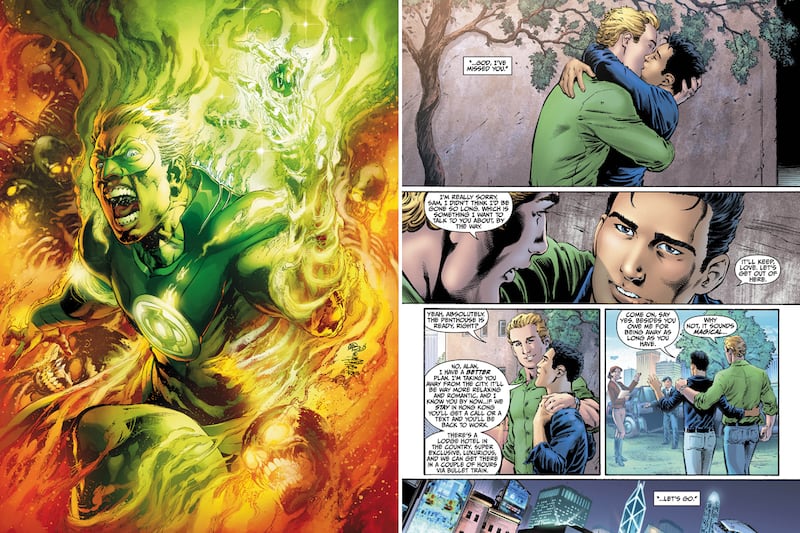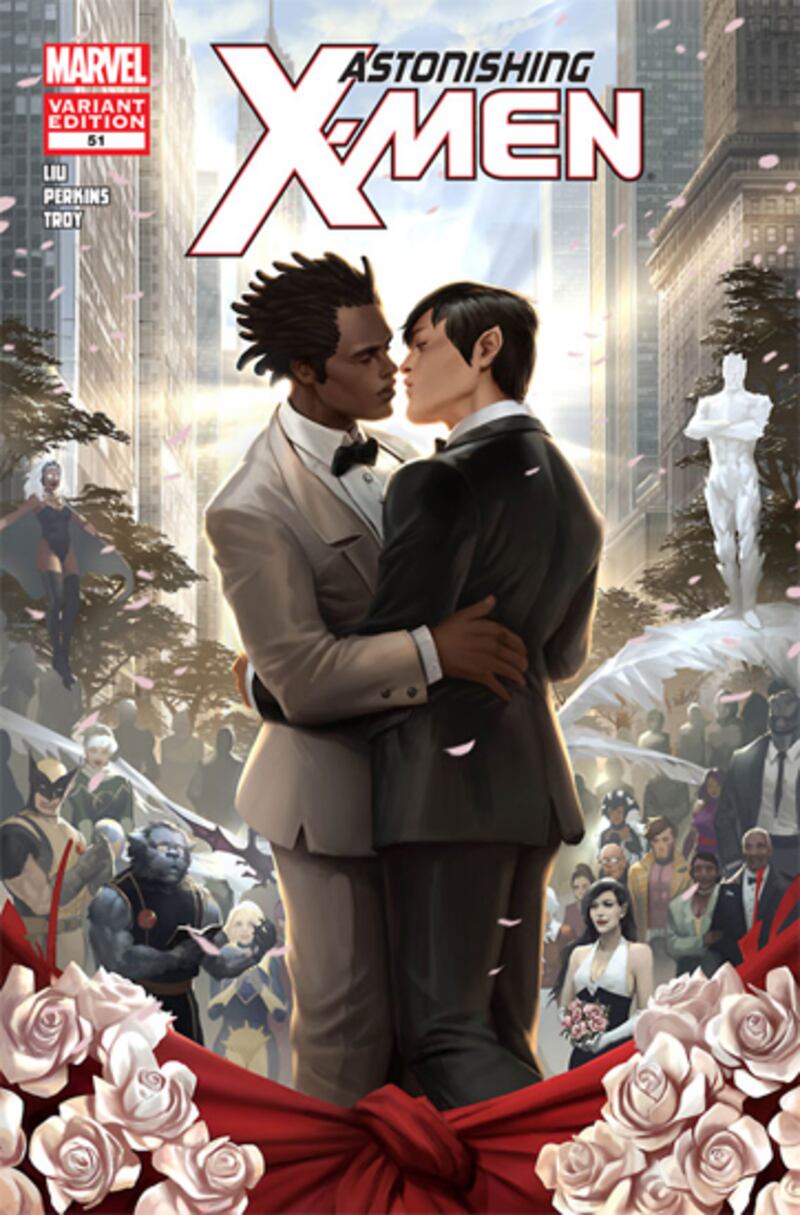Watching Ryan Reynolds dish out one-liners as The Green Lantern’s womanizing superhero, Hal Jordan, might make a gay Green Lantern somewhat hard to imagine. But with Earth 2, a new series in DC Comics’ The New 52, which reimagines some of DC’s most iconic characters, the green-ring bearer is officially out of the closet. Alan Scott, the first superhero to bear the name “Green Lantern” (not to be confused with the Reynolds-portrayed Hal Jordan), will be reintroduced as an openly gay man in Issue 2 of Earth 2, released next Wednesday.
“One of the things that comic-book writers want to do is inject as much realism as possible into their comics,” Earth 2 writer James Robinson told The Daily Beast. “Obviously, we have gay people in life, so we have gay people in comics.”
Although the character of Alan Scott has a history with women (he’s previously gotten flirty with his part-time secretary/part-time villainous rival Harlequin, and even married and had two kids), the new series wipes Scott’s backstory completely clean—that’s not to say, however, that he’s lost any of his “super” qualities. “He’s not just The Gay Character,” Robinson said. “He’s Alan Scott, he’s the leader of the team. He’s a Type-A personality and a successful businessman; he’s gallant, he’s brave, he’s all the things you’d want in a hero.”
DC’s announcement is undoubtedly timely. It comes at a time when President Obama’s endorsement of same-sex marriage and North Carolina’s rejection of its marriage-equality bill are still fresh in people’s minds. And just yesterday, a federal court of appeals issued a ruling declaring the Defense of Marriage Act unconstitutional. But according to Robinson, Green Lantern’s “coming out” has been in the works for at least eight months and happened simply because “it just makes sense.” “The only thing about making Alan Scott young again was that we’d lose Jade, his daughter, and Obsidian, his gay son,” Robinson said. “Eight months ago when I was thinking about all this, I was like, ‘You know what, why don’t we just make Alan Scott gay?’ I ran it past [DC Comics co-publisher] Dan DiDio and he was like, ‘Yeah, that’s a great idea!’”

For his part, Alan looks happy. Images released from the coming-out issue show a smiling, off-duty Green Lantern kissing a man named Sam, who appears to be his partner. The couple makes plans to visit a “super exclusive, luxurious” lodge hotel in the country and walk off toward their chauffeur-driven car, arms around each others’ waists.
Of course, Green Lantern is not the only gay comic book hero who’s been making headlines lately. On the other side of the comic-book fence is rival Marvel Comics, which announced last week that it would be hosting its first same-sex wedding in the June 20 issue of Astonishing X-Men. Superhero speedster Northstar (who was also the first major comic-book character to declare himself gay in 1992’s Alpha Flight #106) is tying the knot with his longtime partner, Kyle—making for comics’ first interracial, same-sex (and mutant-human) marriage.
“The fact that it’s taken this long for us to address these issues in comics is very telling,” Astonishing X-Men writer Marjorie Liu told The Daily Beast. “It says a lot about how uncomfortable people felt with taking risks on subjects that might be controversial. Now I think people feel a bit safer doing so because the tide is being turned. Gay rights is an issue that’s discussed more openly, gay marriage is now legal in New York—they’re not going to lose as much by speaking about it.”
“The way that gay characters have been embraced on mainstream TV and cable have helped things along,” added Marvel editor in chief Axel Alonso. “My favorite character from TV is Omar from The Wire, so maybe all those things have played a factor.”

Not everyone’s sending the soon-to-be-newlywed X-Man good wishes, however. Conservative Christian lobby One Million Moms released a statement this week condemning both Marvel and DC for featuring gay characters in their pages. “Can you imagine little boys saying, ‘I want a boyfriend or husband like X-Men?’ ” the organization wrote in a statement. “This is ridiculous! Why do adult gay men need comic superheroes as role models? They want to indoctrinate impressionable young minds by placing these gay characters on pedestals in a positive light. These companies are heavily influencing our youth by using children’s superheroes to desensitize and brainwash them into thinking that a gay lifestyle choice is normal and desirable. As Christians, we know that homosexuality is a sin.”
“I don’t think those people have a real handle on society. I bet you they haven’t even picked up a comic,” Robinson said bluntly of the One Million Moms statement. “If they want to invoke God and Christianity, I mean, as far as I’m concerned, God and Jesus want tolerance and love for everybody, they don’t want all this hatred and discrimination. I think it’s terrible and they should concentrate on raising their own children and mind their own business.”
Marvel’s Axel Alonso also mused about the children of the women accusing him of “brainwashing” kids. “I’m surprised that from One Million Moms, 10,000 of them aren’t parents of gay kids,” he said. “The last thing we should do is be frightened to offend. We should be looking to create dialogue, provoke, and take people out of their comfort zone—that’s what we do with comics and that’s what we’re gonna do with this story.”
Despite all the vitriol coming from the conservative group, there’s reason to look forward to possible benefits: the last time One Million Moms went after a comic book for featuring a same-sex marriage (in January, when Archie Comics hosted the marriage of Kevin Keller, its first gay character), the issue sold out.
But sales prospects seem to be just one of the potential upsides of featuring gay characters in their stories. Robinson said, “Maybe it’s a good thing if children read comic books and there’s a gay character. Maybe some kid that’s wrestling with his sexuality and is scared sees Alan Scott and thinks, ‘Oh, this is cool’ and it helps him work it out for himself. Or if a kid reads about Alan Scott and goes, ‘Wow, Alan Scott’s cool’ and it makes him think twice about bullying some kid in a playground, then that’s a good thing.”





